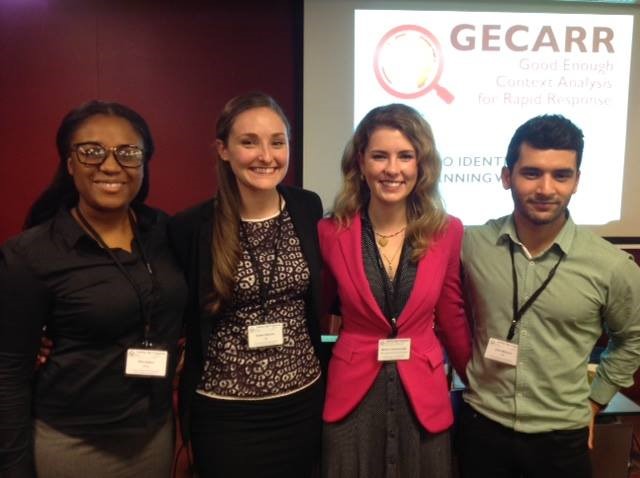MSc Health and International Development students, Nairah Awan, Sarah Larson, Yu Chen, and Omasanjuwa Edun tell us about their research on Re-using Administrative Data for Statistics: Case Studies from Five Countries in partnership with the United Nations Department of Economic and Social Affairs (UNDESA).
As postgraduate student consultants for the United Nations Department of Economic and Social Affairs (UNDESA), we sought to better understand progress toward and barriers to data sharing between administrative sources and statistics producers in five different countries: Chile, Denmark, Ghana, Kenya, and Pakistan. By conducting key-informant and focus-group interviews with both administrative officers and statisticians across the five countries, we drew on the perspectives of experts at different points in data sharing flows to develop our report. Here are some of our take-aways:
Data gaps and challenges
Statisticians, policymakers, and international organizations depend on timely, quality data to produce national statistics, develop effective policies, and monitor development benchmarks. While this data can come from a variety of sources, many countries rely heavily on surveys. However, as anyone who has filled out a survey likely knows, surveys are far from perfect. Not only are surveys burdensome for respondents, but they are time-consuming and costly for data collectors and can suffer from quality issues — such as high non-response rates, missing values, and inaccuracies — that limit their usefulness for statisticians.
The shortcomings of survey data have come into stark focus during the COVID-19 pandemic as many routine survey operations have been delayed, widening information gaps at a moment when effective policy responses are more urgent than ever. In response to persisting data gaps and emerging challenges, there has been growing interest in leveraging administrative data for statistical purposes in order to improve government efficiency and inform policies.
Administrative data and the potential for efficient governance
Governments produce extensive amounts of data that are essential to service delivery through everyday activities. For instance, this data — widely referred to as administrative data — can be extracted from taxation, health, or education records. Emerging crises such as the COVID-19 pandemic have accentuated the need to re-use administrative data and boost data sharing, particularly considering gaps in data collection due to mobility restrictions. However, states would need a centralized data body, one that would be responsible for making sense of the flow of public information for national statistics.
How about the National Statistics Offices (NSOs)? Problem solved. Most states have an NSO that is recognized as the main statistical entity for producing and disseminating official national statistics. However, despite the presence of NSOs and the potential for administrative data to guide policy change, data sharing between the government ministries and NSOs remains, in some cases, sporadic and obscure. And even when data is shared, its format may limit its usefulness for statisticians. We set out to explore why this is the case.
Data and politics
We found that access to administrative records is hindered by a combination of legislative gaps, technical limitations, poor coordination, and negative attitudes towards data sharing. These findings are consistent with what is already known about the challenges to administrative data sharing but situates these issues within distinct contexts. However, in exploring states with varying levels of development and experience with administrative data, we were surprised by the prevalence of barriers beyond technical constraints.
A common thread across different country contexts was that gaps in data sharing were often rooted in lack of political will. Low levels of trust in governments was a salient issue, leading to lack of coordination and excessive reliance on donor interventions. This has resulted in unconnected silos of data across administrative departments and uneven progress in data development across states.
What now?
NSOs can play a critical role in initiating change in data practices due to their centralized authority over national statistics production. We propose that NSOs should produce a strategic plan to implement localized solutions to improve data management practices and collaboration between key stakeholders. Our three-pillar framework — namely, information, guidance, and coordination — acts as a blueprint for NSOs to refine according to local contexts. These relate to disseminating critical information on and using administrative data, developing standards of practice for data use, and facilitating coordination among relevant actors.
However, sustainable development cannot be achieved without a commitment from both domestic and international actors. As we urge for coordination among government agencies and NSOs, development partners should also be cognizant of the impact that their work on data has on existing data management systems and their role in facilitating multilateral cooperation for continuity.
Authors’ reflections on a project on data (and politics)
While the process of conducting research in collaboration with a UN agency was exciting and informative, it was not without its challenges. Ambitious (and admittedly naive), we took on a huge task: studying data systems across five vastly different contexts. When we faced difficulty in gaining access to key informants, we realized that the scope of our research was too broad for the number of people who were willing to talk about data issues.
While these challenges seem operational on the surface, they were rooted in a more complex problem. You guessed it: that data is political. Before we could have conversations, some of the informants had to go through long bureaucratic approval processes or wanted to have a lawyer present, resulting in delays and non-responses. If improving data sharing processes was a shared priority across government agencies, wouldn’t more experts be empowered to speak freely on the issue? This suggests a need for demystifying the bureaucratic black box of data sharing. Thus, building the political will necessary to overcome data sharing barriers can start by having more open conversations about data.
The views expressed in this post are those of the author and in no way reflect those of the International Development LSE blog or the London School of Economics and Political Science.





